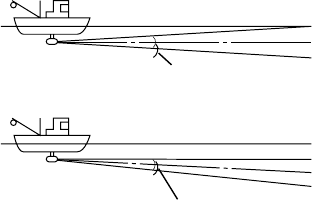
2. HORIZONTAL MODE
2-12
2.4.4 Tilt angle for surface fish
Sound emitted from the sonar transducer forms an oval-shaped beam with a
width of approximately 18° in the vertical direction (vertical beam width at -6dB).
The tilt angle is indicated by the angle between the centerline of the beam and
the horizontal plane. Then, if the tilt angle is set to 0°, the centerline is parallel
with the sea surface and one half of the emitted sound goes upward, toward the
sea surface.
This causes one half of the emitted sound to be reflected toward the transducer
and displayed on the screen as sea surface reflections. When the sea is calm,
since the sound is reflected just like a light hitting a mirror at a low incident angle,
it propagates away and the sea surface reflections become negligible.
However if the sea is not calm enough, they will become dominant and interfere
with observation of wanted echoes. To minimize these sea surface reflections
and to search surface fish schools effectively, the tilt angle is usually set
between 8° and 9° so the upper portion of the beam becomes almost parallel
with the sea surface. When the sea is rough, the tilt angle is slightly increased to
lessen the affect of sea surface reflections.
Tilt angle 0°
Sea surface
Tilt angle 8-9°
Sea surface
18°
18°
Tilt angle


















